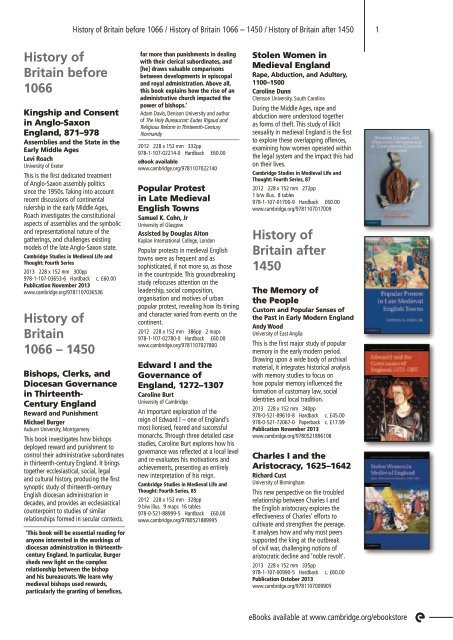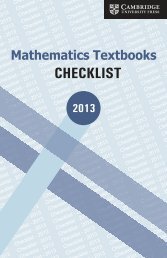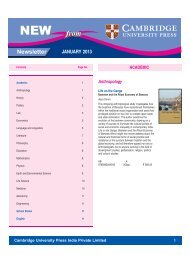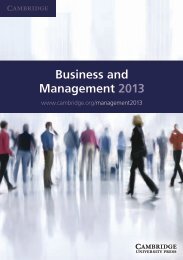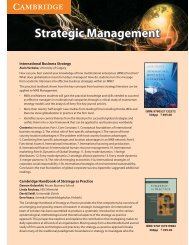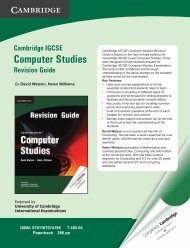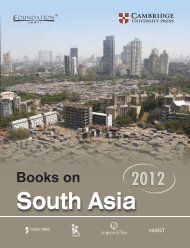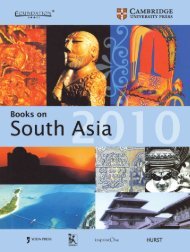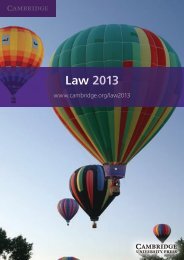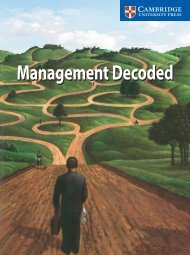History 2013 - Cambridge University Press India
History 2013 - Cambridge University Press India
History 2013 - Cambridge University Press India
You also want an ePaper? Increase the reach of your titles
YUMPU automatically turns print PDFs into web optimized ePapers that Google loves.
<strong>History</strong> of Britain before 1066 / <strong>History</strong> of Britain 1066 – 1450 / <strong>History</strong> of Britain after 1450 1<br />
<strong>History</strong> of<br />
Britain before<br />
1066<br />
Kingship and Consent<br />
in Anglo-Saxon<br />
England, 871–978<br />
Assemblies and the State in the<br />
Early Middle Ages<br />
Levi Roach<br />
<strong>University</strong> of Exeter<br />
This is the first dedicated treatment<br />
of Anglo-Saxon assembly politics<br />
since the 1950s. Taking into account<br />
recent discussions of continental<br />
rulership in the early Middle Ages,<br />
Roach investigates the constitutional<br />
aspects of assemblies and the symbolic<br />
and representational nature of the<br />
gatherings, and challenges existing<br />
models of the late Anglo-Saxon state.<br />
<strong>Cambridge</strong> Studies in Medieval Life and<br />
Thought: Fourth Series<br />
<strong>2013</strong> 228 x 152 mm 300pp<br />
978-1-107-03653-6 Hardback c. £60.00<br />
Publication November <strong>2013</strong><br />
www.cambridge.org/9781107036536<br />
<strong>History</strong> of<br />
Britain<br />
1066 – 1450<br />
Bishops, Clerks, and<br />
Diocesan Governance<br />
in Thirteenth-<br />
Century England<br />
Reward and Punishment<br />
Michael Burger<br />
Auburn <strong>University</strong>, Montgomery<br />
This book investigates how bishops<br />
deployed reward and punishment to<br />
control their administrative subordinates<br />
in thirteenth-century England. It brings<br />
together ecclesiastical, social, legal<br />
and cultural history, producing the first<br />
synoptic study of thirteenth-century<br />
English diocesan administration in<br />
decades, and provides an ecclesiastical<br />
counterpoint to studies of similar<br />
relationships formed in secular contexts.<br />
‘This book will be essential reading for<br />
anyone interested in the workings of<br />
diocesan administration in thirteenthcentury<br />
England. In particular, Burger<br />
sheds new light on the complex<br />
relationship between the bishop<br />
and his bureaucrats. We learn why<br />
medieval bishops used rewards,<br />
particularly the granting of benefices,<br />
far more than punishments in dealing<br />
with their clerical subordinates, and<br />
[he] draws valuable comparisons<br />
between developments in episcopal<br />
and royal administration. Above all,<br />
this book explains how the rise of an<br />
administrative church impacted the<br />
power of bishops.’<br />
Adam Davis, Denison <strong>University</strong> and author<br />
of The Holy Bureaucrat: Eudes Rigaud and<br />
Religious Reform in Thirteenth-Century<br />
Normandy<br />
2012 228 x 152 mm 332pp<br />
978-1-107-02214-0 Hardback £60.00<br />
eBook available<br />
www.cambridge.org/9781107022140<br />
Popular Protest<br />
in Late Medieval<br />
English Towns<br />
Samuel K. Cohn, Jr<br />
<strong>University</strong> of Glasgow<br />
Assisted by Douglas Aiton<br />
Kaplan International College, London<br />
Popular protests in medieval English<br />
towns were as frequent and as<br />
sophisticated, if not more so, as those<br />
in the countryside. This groundbreaking<br />
study refocuses attention on the<br />
leadership, social composition,<br />
organisation and motives of urban<br />
popular protest, revealing how its timing<br />
and character varied from events on the<br />
continent.<br />
2012 228 x 152 mm 386pp 2 maps<br />
978-1-107-02780-0 Hardback £60.00<br />
www.cambridge.org/9781107027800<br />
Edward I and the<br />
Governance of<br />
England, 1272–1307<br />
Caroline Burt<br />
<strong>University</strong> of <strong>Cambridge</strong><br />
An important exploration of the<br />
reign of Edward I – one of England’s<br />
most lionised, feared and successful<br />
monarchs. Through three detailed case<br />
studies, Caroline Burt explores how his<br />
governance was reflected at a local level<br />
and re-evaluates his motivations and<br />
achievements, presenting an entirely<br />
new interpretation of his reign.<br />
<strong>Cambridge</strong> Studies in Medieval Life and<br />
Thought: Fourth Series, 85<br />
2012 228 x 152 mm 328pp<br />
9 b/w illus. 9 maps 16 tables<br />
978-0-521-88999-5 Hardback £60.00<br />
www.cambridge.org/9780521889995<br />
Stolen Women in<br />
Medieval England<br />
Rape, Abduction, and Adultery,<br />
1100–1500<br />
Caroline Dunn<br />
Clemson <strong>University</strong>, South Carolina<br />
During the Middle Ages, rape and<br />
abduction were understood together<br />
as forms of theft. This study of illicit<br />
sexuality in medieval England is the first<br />
to explore these overlapping offences,<br />
examining how women operated within<br />
the legal system and the impact this had<br />
on their lives.<br />
<strong>Cambridge</strong> Studies in Medieval Life and<br />
Thought: Fourth Series, 87<br />
2012 228 x 152 mm 272pp<br />
1 b/w illus. 8 tables<br />
978-1-107-01700-9 Hardback £60.00<br />
www.cambridge.org/9781107017009<br />
<strong>History</strong> of<br />
Britain after<br />
1450<br />
The Memory of<br />
the People<br />
Custom and Popular Senses of<br />
the Past in Early Modern England<br />
Andy Wood<br />
<strong>University</strong> of East Anglia<br />
This is the first major study of popular<br />
memory in the early modern period.<br />
Drawing upon a wide body of archival<br />
material, it integrates historical analysis<br />
with memory studies to focus on<br />
how popular memory influenced the<br />
formation of customary law, social<br />
identities and local tradition.<br />
<strong>2013</strong> 228 x 152 mm 340pp<br />
978-0-521-89610-8 Hardback c. £45.00<br />
978-0-521-72067-0 Paperback c. £17.99<br />
Publication November <strong>2013</strong><br />
www.cambridge.org/9780521896108<br />
Charles I and the<br />
Aristocracy, 1625–1642<br />
Richard Cust<br />
<strong>University</strong> of Birmingham<br />
This new perspective on the troubled<br />
relationship between Charles I and<br />
the English aristocracy explores the<br />
effectiveness of Charles’ efforts to<br />
cultivate and strengthen the peerage.<br />
It analyses how and why most peers<br />
supported the king at the outbreak<br />
of civil war, challenging notions of<br />
aristocratic decline and ‘noble revolt’.<br />
<strong>2013</strong> 228 x 152 mm 335pp<br />
978-1-107-00990-5 Hardback c. £60.00<br />
Publication October <strong>2013</strong><br />
www.cambridge.org/9781107009905<br />
eBooks available at www.cambridge.org/ebookstore


